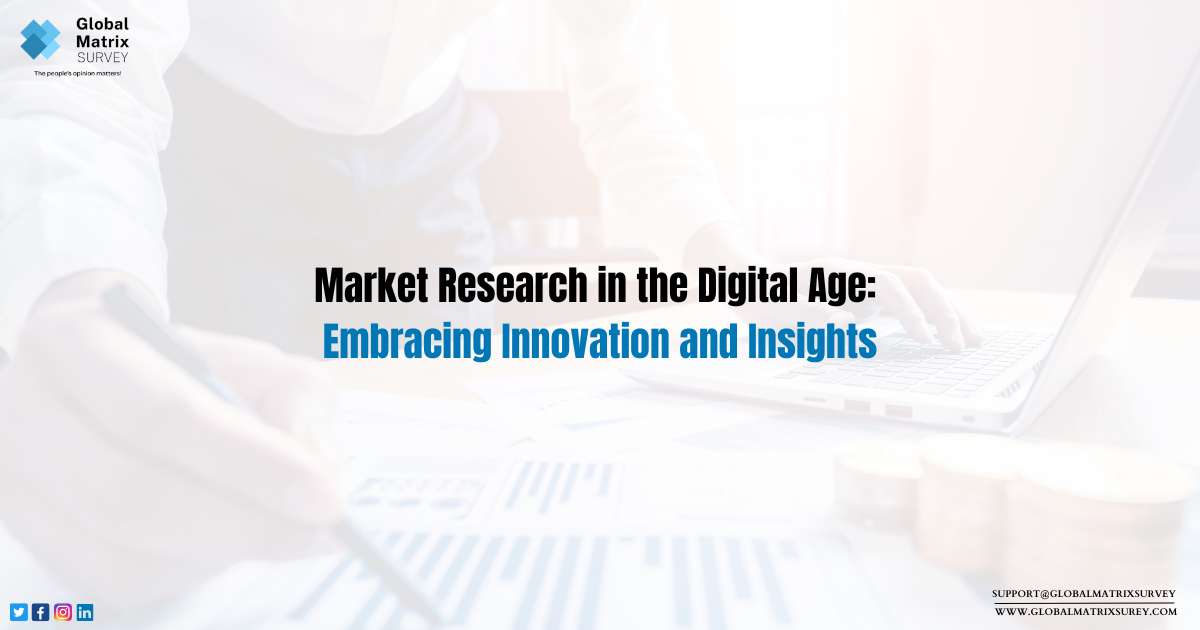Blog | Sat, 01 Jun 24
Market Research in the Digital Age: Embracing Innovation and Insights
Market research has undergone a significant transformation in the digital age, evolving from traditional methods to incorporating cutting-edge digital technologies. This shift has enabled businesses to gain deeper insights, respond more quickly to market changes, and engage with consumers in new and meaningful ways.

Market Research in the Digital Age: Embracing Innovation and Insights
Introduction
Market research has undergone a significant transformation in the digital age, evolving from traditional methods to incorporating cutting-edge digital technologies. This shift has enabled businesses to gain deeper insights, respond more quickly to market changes, and engage with consumers in new and meaningful ways. This blog explores the impact of digital advancements on market research, the tools and techniques driving this evolution, and the benefits and challenges that come with it.
The Evolution of Market Research
1. Traditional vs. Digital Market Research
- Traditional Methods: Surveys, focus groups, and in-person interviews were the mainstays of market research, providing valuable but often limited insights.
- Digital Methods: Online surveys, social media analytics, web scraping, and mobile research have expanded the scope and depth of market research, enabling real-time data collection and analysis.
2. The Role of Big Data
- Data Volume: The digital age has seen an explosion of data from various sources, including social media, e-commerce, and IoT devices.
- Data Integration: Integrating big data with traditional research methods allows for a more comprehensive understanding of consumer behavior and market trends.
Key Digital Tools and Techniques
1. Social Media Analytics
- Sentiment Analysis: AI-powered tools analyze social media posts to gauge public sentiment and identify emerging trends.
- Influencer Tracking: Monitoring the impact of influencers on brand perception and consumer behavior.
2. Web Scraping
- Competitive Analysis: Extracting data from competitors' websites to understand their strategies and market positioning.
- Trend Monitoring: Identifying and tracking industry trends through news sites, blogs, and forums.
3. Mobile Research
- Mobile Surveys: Conducting surveys via mobile apps and SMS to reach a broader audience.
- Geolocation Data: Using location-based data to understand consumer behavior patterns and preferences.
4. Online Panels and Communities
- Virtual Focus Groups: Engaging with consumers in online communities to gather qualitative insights.
- Crowdsourcing: Leveraging online platforms to collect feedback and ideas from a large, diverse group of people.
5. AI and Machine Learning
- Predictive Analytics: Using machine learning algorithms to forecast market trends and consumer behavior.
- Automated Data Analysis: AI tools that can quickly analyze large datasets, identifying patterns and anomalies.
Benefits of Digital Market Research
1. Real-Time Insights
- Speed: Digital tools provide immediate access to data, enabling faster decision-making.
- Agility: Businesses can quickly adapt to changing market conditions and consumer preferences.
2. Enhanced Accuracy
- Data Quality: Digital methods reduce human error and increase the precision of data collection and analysis.
- Comprehensive Insights: Combining multiple data sources leads to a more holistic view of the market.
3. Cost Efficiency
- Reduced Costs: Digital research methods often cost less than traditional approaches, particularly in terms of data collection and analysis.
- Scalability: Digital tools can easily scale to handle large volumes of data, making them suitable for businesses of all sizes.
4. Greater Reach
- Global Reach: Digital research can easily reach international audiences, providing insights into global markets.
- Diverse Demographics: Online tools enable researchers to engage with a wide range of demographic groups.
Challenges of Digital Market Research
1. Data Privacy and Security
- Regulatory Compliance: Navigating data privacy laws such as GDPR and CCPA.
- Consumer Trust: Ensuring transparent and ethical data practices to maintain consumer trust.
2. Data Overload
- Filtering Noise: Identifying relevant data amidst the vast amount of information available online.
- Actionable Insights: Translating large volumes of data into meaningful and actionable insights.
3. Technology Integration
- Compatibility: Ensuring new digital tools integrate seamlessly with existing systems and processes.
- Training: Providing staff with the necessary skills to use advanced digital tools effectively.
Future Trends in Digital Market Research
1. Advanced AI and Machine Learning
- Deeper Insights: Continued advancements in AI will enable even more sophisticated data analysis and predictive modeling.
- Personalization: AI will enhance the ability to deliver highly personalized consumer experiences based on real-time data.
2. Voice and Visual Data Analysis
- Voice Search: Analyzing voice search data to understand consumer needs and preferences.
- Image Recognition: Using AI to analyze visual content on social media and other platforms.
3. Integration of IoT Data
- Smart Devices: Leveraging data from connected devices to gain insights into consumer behavior and preferences.
- Real-Time Monitoring: Using IoT data for continuous, real-time market research.
4. Ethical AI and Data Practices
- Transparency: Developing AI systems that are transparent and explainable.
- Bias Mitigation: Ensuring AI models are free from biases and ethical concerns.
Conclusion
The digital age has revolutionized market research, providing businesses with powerful tools and techniques to gain deeper, real-time insights into their markets and consumers. While the benefits are substantial, including increased accuracy, cost efficiency, and greater reach, challenges such as data privacy and technology integration must be carefully managed. As technology continues to evolve, market research will become even more integral to business strategy, driving innovation and competitive advantage. By embracing digital methods, businesses can stay ahead of the curve, making informed decisions that align with the ever-changing market landscape.
Global Matrix Survey is ready to help your business.
Qualitative Research: Definition, Types, Methods, and examples
What is an online survey & the Advantage of the online survey?
How to conduct an online survey?
Why online survey is best for businesses?
What is a growth strategy for any business?
Difference between Qualitative Research and Quantitative Research
https://www.globalmatrixsurvey.com/blog/is-online-survey-safe-for-companies-amp-businesses-/

